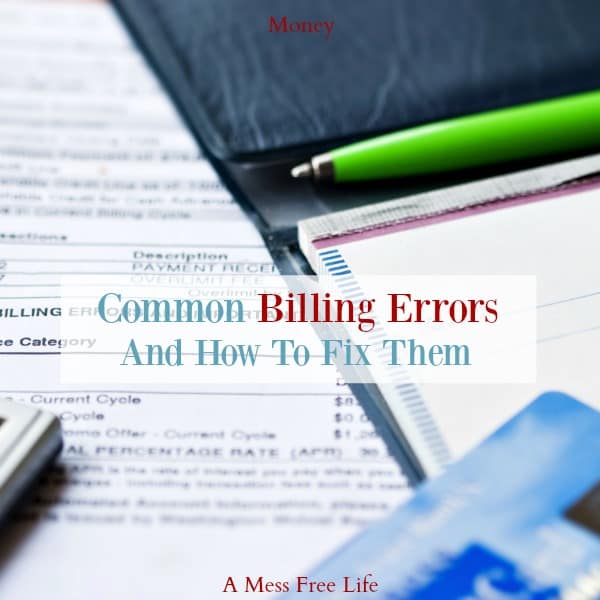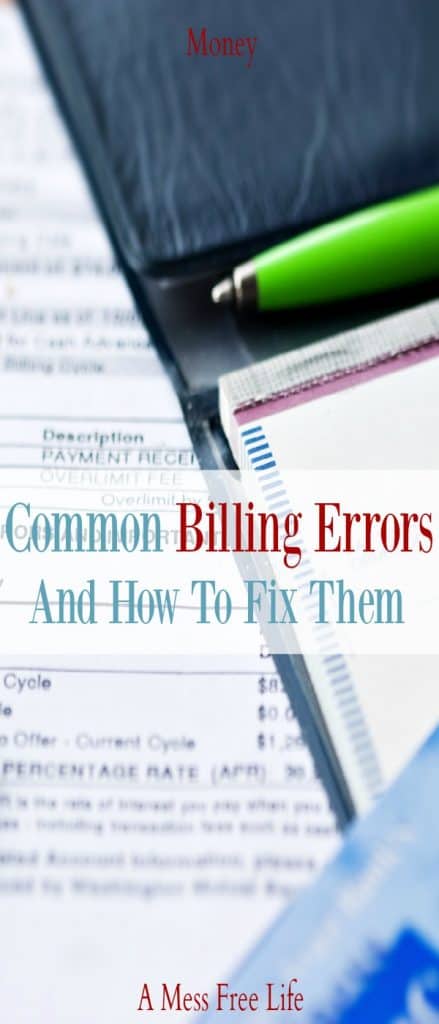A Mess Free Life may collect a share of sales or other compensation from the links on this page.
You could be spending hundreds of dollars a year on common billing errors to your utilities and credit cards without even realizing it. Usually, because you don’t take the time to thoroughly review your bill or because you’re not sure what to look for. But the money you’re unnecessarily paying could be used for something more worthwhile. Almost anything except for extra payments to your utilities or credit cards!
Table of Contents
HOW TO RECOGNIZE COMMON BILLING ERRORS AND HOW TO FIX THEM
Life gets busy and the bills are something we just assume are usually correct so most people don’t take the time to look them over billing errors. They pay them or set them aside for later, never really reviewing the charges to make sure they’re accurate. And in most cases, they are correct.
But’s it’s worth the extra time to just be sure. It only takes an extra couple of minutes to make sure you’re not overpaying and it’s time well spent.
GENERAL GUIDELINES
There are a few things you can start doing now that will make it easier when next month’s bills arrive to review them.
For starters, always save the current month’s bill until the next one arrives. This gives you the opportunity to compare charges and usage from the previous billing cycle to the current one.
Next, when you pay the current bill, write the date and amount paid on it. Having this information handy will make it much easier to know that you paid your bill in full and on time instead of having to go through your bank statements to find your payment.
And lastly, note any fees you paid. For instance, if the company charged you a fee for processing your payment online. Fees are the most common billing mistake so you want to make sure you’re noting the amount of any fee you pay to make it easier to dispute later.
If you pay your bills online, you’ll still want to keep track of this information. Keep it in a spreadsheet or write it next to your monthly spending plan and then file the plan away and keep until you’re sure everything you’ve paid is accurate. Our Family Budgeting and Finance Bundle might be the perfect solution to helping you catch those common billing errors by working with your family and reach your money goals.
Let’s take a look at some of the most common billing errors. When reviewing your bills, here are a few things to look for:
METER READ ERRORS
If your utility bill is higher than usual, it could mean that your meter is not working properly or was transcribed incorrectly when it was read. Your energy consumption is usually charged based on a reading taken directly from your meter. Your electric bill should also include your average usage per month for the last twelve months. If it’s not on your bill, you can find it in your online account information or by calling the utility company. Compare the current month to the same month last year. If there’s a significant difference, there may be a meter problem. If you feel there was an error in the reading, double check it yourself or ask the utility company to check the meter for problems.
OVERLAP IN BILLING PERIODS
One thing most people never check from one bill to the next is the dates of the billing period. If your current bill overlaps your previous bill, you are being charged for extra days. Even if it’s just one or two days, those are extra days you’re paying. When your new bill arrives, compare the dates to your previous bill. If the dates overlap, you need to contact your utility company. If the overlapping dates are on your credit card statement, you’re being charged double the interest on those dates so a phone call or email to the credit card company is in order.
WRONG ESTIMATION
This often happens if you auto pay your bills for the same amount every month. If the current month is less than what you are scheduled to pay, you are due a refund from the utility company. After all, if your bill is higher than your normal payment, they will certainly charge you the additional amount. They rarely reduce your payment though so you will need to contact them directly to get a refund issued.
CALCULATION ISSUES
Mistakes happen to all of us. Take a moment to add up the charges on your bill to ensure that they are equal to the amount you’re being charged. Sometimes the calculations are incorrect and what you actually owe is different than the amount on the bill. If this happens, contact your utility company to correct it. Otherwise, they’ll charge you a late fee on the amount you short-paid your bill.
LATE FEES
Again, be sure to check your billing dates and the date of your payment. If your last payment was paid online on the date it was due, chances are it did not post until midnight, so the computer thinks you paid a day late and charges you a late fee. If this happens, call the company and confirm the date of your payment so that they can remove this fee. This is another charge that will accumulate interest and additional late fees if you just ignore it and don’t pay it. It’s important to have it credited back.
INACCURATE RATES
Utility company rates can be difficult to calculate and understand especially when it comes to water, gas, and electric bills. Rates can vary based on time of year, usage, and even what’s happening in the stock market. That’s why it’s so easy to get overcharged. Between human errors and computer errors, inaccurate rates can easily be billed. If the rate you’re being charged is different than what you think it should be based on previous bills, contact your utility company to verify it and ask them to explain how the rate was determined.
PRODUCT AND SERVICE ERRORS
These billing errors frequently occur on your credit card statements so it’s a good idea to review every charge on a monthly basis. You may have been charged for a product or service you didn’t receive, or you may have been charged full price for something you were supposed to receive a discount for. Another possibility is getting charged twice for the same product or service. If this happens, first contact the company where you made the purchase and ask them to credit your card accordingly. This is the fastest and easiest way to get a credit back to your account. If they don’t comply, call your credit card company and file a dispute.
CONCLUSION
Billing errors are all too common and not noticing them can be costing you hundreds of dollars. Take the time to review your bills each and every month. This is the best way to ensure you’re paying what you’re supposed to be and avoid being overcharged.




